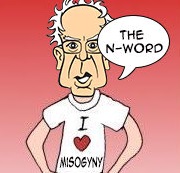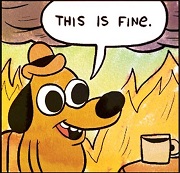|
asdf32 posted:One step at a time here. No, that is not correct.
|
|
|
|

|
| # ? Apr 29, 2024 00:30 |
|
Peel posted:No, that is not correct. Why? There can be S even if hypothetically all labor was productive (I understand this is rarely possible with Marx's definitions). asdf32 has issued a correction as of 21:40 on Jul 26, 2017 |
|
|
|
asdf32 posted:Why? There can be S even if hypothetically all labor was productive (I understand this is rarely possible with Marx's definitions). that isn't how any of these concepts work, you're just making up new definitions for things, try doing this to people who aren't actively studying the text you're butchering lol
|
|
|
|
i could be wrong but i don't think unproductive labour even enters the analysis in a serious way until volume 2
|
|
|
|
for any book readers not familiar with asdf he has a long history of walking into marxism discussions and trapping them for pages on end in circular arguments over basic concepts, while making confident pronouncements to people who have more relevant knowledge than he does, which is why we are being short in this of all threads but i forgot to answer this: Annual Prophet posted:Hey Peel is there a particular hard copy translation that's better than others? Would like to get vol 2 in that form if there's a worthwhile translation. (If not, I'll work with the free online version.) Harvey uses the Penguin Classics translation, which is also the version I have in ebook. I don't know what the alternatives are, but if it's good enough for a marxist professor...
|
|
|
|
Under capitalism, each firm producing for exchange competes for market share. That is the root cause of exploitation. The organization of the firm merely determines how the surplus value is managed and distributed. It doesn't matter if the workers are slaves, they own some stocks in the company, or they work in a co-op. The firm is incentivized to exploit the workers in order to compete in the market, regardless of if they manage themselves, are managed by a single owner, or are managed indirectly by a board of directors. Aeolius's example is fine to illustrate where zero surplus value is technically possible, but it is a bit misleading when used to illustrate how capitalism actually exists. This carpenter is not acting rationally. The carpenter (and all of his competition) would be competing not only for income now, but for an expectation of income in the future. So, each one would be incentivized to reinvest into more advanced capital, so that they could produce more cheaply (or produce a better product, entering into a market of different use values) in the future. As such, the carpenter would extract from himself a surplus value that would accumulate into a more advanced -- and therefore a larger accumulation of -- capital.
|
|
|
|
|
Peel posted:for any book readers not familiar with asdf he has a long history of walking into marxism discussions and trapping them for pages on end in circular arguments over basic concepts, while making confident pronouncements to people who have more relevant knowledge than he does, which is why we are being short in this of all threads Perfect, thank you Peel!
|
|
|
|
Ruzihm posted:Under capitalism, each firm producing for exchange competes for market share. That is the root cause of exploitation. The organization of the firm merely determines how the surplus value is managed and distributed. I don't think that's quite right, I think it's more fundamental than that. Competition obliges competing capitalists to exploit their workers, but the exploitation itself just originates from v vs v+s, workers being paid at the value needed to reproduce their labour-power, but producing more value than that. This happens even under monopoly conditions. In Aeolius' example there's no 'surplus value' produced and hence no exploitation because the worker, receiving the full proceeds, is compensated at the full value of his labour. At some point in volume 1 I think Marx refers to workers receiving the full value of their labour and still setting some aside to improve their means of production, and this not being surplus value in the capitalist sense. The crucial distinction there is that it is under their own control. But the categories are starting to get warped. The model in Capital is a model of the capitalist firm, a society of independent producers or worker co-operatives is not what it's designed to describe, Peel has issued a correction as of 23:17 on Jul 26, 2017 |
|
|
|
Asdf, can't you find another thread to argue in? I'd appreciate if we kept this thread on topic.
|
|
|
|
My suggestion is mod challenge asdf to read Capital and deliver a book report 
|
|
|
|
Peel posted:I don't think that's quite right, I think it's more fundamental than that. Competition obliges competing capitalists to exploit their workers, but the exploitation itself just originates from v vs v+s, workers being paid at the value needed to reproduce their labour-power, but producing more value than that. This happens even under monopoly conditions. In Aeolius' example there's no 'surplus value' produced and hence no exploitation because the worker, [b]receiving the full proceeds, is compensated at the full value of his labour.[b] At some point in volume 1 I think Marx refers to workers receiving the full value of their labour and still setting some aside to improve their means of production, and this not being surplus value in the capitalist sense. The crucial distinction there is that it is under their own control. And my point was simply that if all people involved in the production of a good were labeled 'productive', as is the case with a self-employed carpenter, then the price of the good would be equal to the 'full value' of their labor: thus no surplus and no exploitation is possible. The analytical value of the distinction between productive and unproductive workers is thus critical to Marxian analysis. Dreddout posted:Asdf, can't you find another thread to argue in? I'd appreciate if we kept this thread on topic. I don't think I've even criticized Marxism yet and actually jumped in attempting to add something. Most of the posts in response are anticipating me doing something I haven't even done yet, and tactical suggestion, just answer the simple questions simply. asdf32 has issued a correction as of 01:47 on Jul 27, 2017 |
|
|
|
asdf32 posted:And my point was simply that if all people involved in the production of a good were labeled 'productive', as is the case with a self-employed carpenter, then the price of the good would be equal to the 'full value' of their labor: thus no surplus and no exploitation is possible. The analytical value of the distinction between productive and unproductive workers is thus critical to Marxian analysis. Nope. A workplace can be all productive workers and exploitative. To find out more, I suggest reading Capital, vol. 1 ch. 1-9 or so.
|
|
|
|
Stepping back into the bot-dung because I didn't see anyone catching this butasdf32 posted:One step at a time here. The carpenter in the example was unproductive. We're discussing being "productive" of surplus value, which does not exist under simple commodity production. And, as I said, this analysis is from the perspective of capital. Capital needs to exist to have a perspective. now get the gently caress out of here with your Just Asking Questions game; you've had literal years (most of a decade iirc) of attempting to nitpick this stuff to have picked up even one or two elementary details. go read a book Aeolius has issued a correction as of 02:14 on Jul 27, 2017 |
|
|
|
asdf32 posted:I don't think I've even criticized Marxism yet and actually jumped in attempting to add something. Most of the posts in response are anticipating me doing something I haven't even done yet, and tactical suggestion, just answer the simple questions simply. I don't give a poo poo what your intention is. This thread is specifically for goons interested in reading Capital together. You've been Go argue in the LF thread
|
|
|
|
Crap, it finally happened to me Quote != edit
|
|
|
Peel posted:I don't think that's quite right, I think it's more fundamental than that. Competition obliges competing capitalists to exploit their workers, but the exploitation itself just originates from v vs v+s, workers being paid at the value needed to reproduce their labour-power, but producing more value than that. This happens even under monopoly conditions. Peel posted:In Aeolius' example there's no 'surplus value' produced and hence no exploitation because the worker, receiving the full proceeds, is compensated at the full value of his labour. Peel posted:At some point in volume 1 I think Marx refers to workers receiving the full value of their labour and still setting some aside to improve their means of production, and this not being surplus value in the capitalist sense. The crucial distinction there is that it is under their own control. Peel posted:But the categories are starting to get warped. The model in Capital is a model of the capitalist firm, a society of independent producers or worker co-operatives is not what it's designed to describe, I'm not convinced that a worker co-operative that is producing for exchange is anything but a capitalist firm, albeit one in which the exploitation is agreeably distributed among its worker-owners.
|
|
|
|
|
Ruzihm posted:Agreed, but that is because there is no commodity production here. The carpenter appears to be operating in a gift-based society, not in one where his future livelihood depends on his competitiveness in a market. We are indeed discussing commodities, per "simple commodity production" or circulation. It's the "what if C-M-C were universalized" thing; see Vol 1, Ch 4. You were correct before to regard it as a poor model of capitalism, because it's not really a model of capitalism, but of commodity exchange in a form prior to capital. It has existed in a minor capacity under various modes of production, but it doesn't generally get the full "mode of production" billing because it's never (and almost certainly could never) predominate and therefore structure a society. So when we envision a whole society of individual self-employed producers, this is taken to be an imaginary construct just for illustrative purposes. Ruzihm posted:I'm not convinced that a worker co-operative that is producing for exchange is anything but a capitalist firm, albeit one in which the exploitation is agreeably distributed among its worker-owners. I agree with this. A cooperative, a non-profit, etc., is still subject to the logic of capital that rings through the entire system. It still deals with the labor market, anarchy of production, the law of value, etc. I've remarked elsewhere about how subordinate modes of production become structured by a dominant one (e.g. the NEP of the USSR, slavery in the USA, etc), and that's something we can see plainly here — an ostensible workplace democracy is still confronted with the overarching external contradictions, in the end effectively internalizing and reproducing them. In fact, this relates directly to the point up top; a society entirely made up of competing market cooperatives would essentially exhibit the same character as the "simple" system mentioned, with the firm rather than the individual being the market-facing productive structure. Either case tendentially (even if only through market frictions initially) creates conditions that would enable capital to dominate once more. Socialism will require building a system in which cooperation ultimately replaces competition, with collaborative efforts to plan production on the basis of use rather than exchange. Here's a blurb from David McNally's "Against the Market," which is as thorough a treatment of the topic as I've encountered: quote:The essence of the political economy of capital is the exploitation of labour, the maximization of surplus-value for capital. But whereas capital defines wealth in terms of the maximization of surplus labour, for workers "wealth is disposable time and nothing more." The Ten Hours Bill, like more than a century of subsequent working-class struggle internationally, demonstrates that workers strive to limit the time in which they are subject to the dictates of capital, to win time for their own free self-development. For workers, "free time, disposable time, is wealth itself, partly for the enjoyment of the product, partly for the free activity which - unlike labour - is not dominated by the pressure of an extraneous purpose."23 (So, the dictatorship of the proletariat remains the first major objective.) Aeolius has issued a correction as of 20:31 on Jul 27, 2017 |
|
|
|
Aeolius posted:Stepping back into the bot-dung because I didn't see anyone catching this but You're right. LTV is from the capitalist's perspective. Productive is defined as productive of surplus for the capitalist. Correct? So to be clear a worker owned coop isn't full socialism, but also doesn't exploit per the basic definition of exploitation either because no capitalist is receiving surplus correct?
|
|
|
|
asdf32 has been posting entry-level homespun objections to Marxism in these sorts of threads for years, and I would recommend not engaging with him at all.
|
|
|
|
What do you guys think (not you asdf) are solutions to the problem with currency's privileging of exchange-value over use-value? I've considered time coupons, but the more I think about it the less I'm certain a socialist society would actually benefit by giving workers their surplus-value back to them in toto (which as I understand it, would be the effect of a time currency system). A society where surplus-value is spent exclusively on consumer goods would be wasteful (C-M-C circuit), an institution would thus still be needed to appropriate a portion of the value of the worker's labor to accumulate and grow the means of production (socialized in this scenario), extend and improve social programs, and eventually achieve autarky. I've also encountered techno-utopian type set ups where currency would be eliminated and sophisticated computer systems would make the necessary logistical adjustments to the manifold divisions of labor in place of the market system. With the advent of smart phones, I can imagine an app that directs workers to open job-sites where the means of production are socialized or some such thing. But then the downside here is that workers wouldn't have much of an incentive to work and so I can imagine that society spontaneously developing some sort of tacitly enforced sense of "social responsibility" or legal-mandate in order to coerce workers into working. Thoughts?
|
|
|
Electric Owl posted:What do you guys think (not you asdf) are solutions to the problem with currency's privileging of exchange-value over use-value? If we're talking about the critique of the gotha program, Marx was pretty clear that even the lower phase of communism is still a communist society; i.e., that the use of labor vouchers is in part of an effort to eschew production for exchange entirely. The use of labor vouchers allows for a rationing of scarce produce as well as an incentive for productive labor. Compensation would not rely on how much products are sold, but merely on the intensity & duration of your labor and if your labor is sufficiently useful (no labor vouchers for making mud pies). But what is being rationed here? Here's what Marx says labor vouchers should ration: https://www.marxists.org/archive/marx/works/1875/gotha/ch01.htm posted:Let us take, first of all, the words "proceeds of labor" in the sense of the product of labor; then the co-operative proceeds of labor are the total social product. First, means of production must first be maintained. Second, technology & productivity must advance. Third, accidents & disasters must be insured. Fourth, any additional administration maintenance must be performed. Fifth, common welfare must be kept. SIxth, society must care for those who can not care for themselves. Finally, what products that remain is what should be rationed off based upon the distribution of labor vouchers. In our world today where we regularly see food gluts & so much empty housing, I think we could certainly consider food & housing guaranteed to all under the 5th pre-ration distribution. So what remains? Products that are not yet sufficiently produced enough to meet everyone's needs. And I think it's reasonable to ration luxurious things like vanilla beans or saffron based on labor vouchers.
|
|
|
|
|
2-04: Chapters 7-11 "What is a city if not a huge amount of fixed capital? And yet there is a lot of motion within the city. And the city has to be designed so as to facilitate the motion." https://www.youtube.com/watch?v=TDn8jlSC4Wc The key concept in these chapters is fixed capital, as distinct from 'fluid' or circulating capital. Fixed capital is capital that persists after the production process, i.e. only gives up part of its value to the product in one 'cycle' of the process. An example would be a blast furnace: this consumes x coal, iron ore, labour each day, which give their full value to the product each day, but the furnace itself lasts for y thousands of days and gives 1/y000 of its value to the product each day. Chapter 8 is the essential chapter here that outlines the categories in its first part and in its second part discusses the additional factors of repairs, moral depreciation, et cetera. 7 and 9 discuss turnover periods in this context and extend the analysis of the organisation of capital in time. Fixed capital presents some problems for capitalists. It requires more up-front investment. It makes your investments vulnerable to technological change. It requires continued combination with circulating capital not to be useless, which in the case of capital fixed to one place (land improvements, for example) requires the circulating capital to come to the location of the fixed capital. But things 'fixed' in one place are not necessarily fixed capital. For a capitalist who constructs infrastructure in order to sell it, infrastructure is circulating capital he need not think about long-term, even though the long-term use is what is important from the general social perspective. We can see how this causes problems in the case of the recent American housing market crisis, or empty cities and useless infrastructure in China (houses, incidentally, are fixed but part of the consumption fund rather than capital). Snarls like this take us further from the volume 1's idyll of infinite untroubled expanded reproduction. Chapters 10 and 11 are Marx's critique of Smith and Ricardo. They're of limited interest until you're into 19th century intellectual debates. Besides discussing the text itself (including digging out interesting parts from the otherwise difficult to penetrate chapters 10 and 11), the lecture discusses some additional perspectives from the Grundrisse. Timestamps: 0:02:32 - fixed capital, Capital vol 2 and the Grundrisse 0:23:15 - fixed capital defined 0:28:46 - geographical fixation 0:38:00 - capital with multiple functions, fixed capital & economic development 0:53:35 - Q&A 1:01:11 - repairs & replacements 1:04:11 - capital depreciation 1:23:47 - Q&A Peel has issued a correction as of 19:47 on Jul 31, 2017 |
|
|
|
Next week is the start of the detour through volume 3, so get a copy ready. The free marxists.org version is here.
|
|
|
|
Ruzihm posted:I'd like to read this in context, because it seems to be contrary to much I've understood from reading Capital. If you could point this out to me I'd super duper appreciate it. About market competitive co-ops in general, after thinking I think it's right to say they in theory replicate capitalist relations to a significant extent. There's two things Marx repeatedly invokes in Capital: first, that capitalists are compelled to harshen exploitation, advance production etc. by competitive pressures, and second that 'capitalist' is a role, not a person. Capitalists insofar as they are following the role of a capitalist, of being the conscious personified form of capital, will follow the dictates of capitals self-expansion, and so on. There's a sense of capital as an alien parasite taking over human self-determination. So this being a role not a person, it can be taken out of a separate capitalist and shared across the workers. On the other hand though, we have to ask how class struggle works in this context. Obviously there's a psychologistic interpretation of the struggle within each individual, and the social struggles over the distribution of 'surplus' within each firm and between firms (the question of how money capital is controlled here is pretty critical). But when you get to the state, what does it mean to be the 'managing committee of the whole bourgeoisie' when there's no separate bourgeoisie? This is where I'm more optimistic. A society that got to this point was obviously already able to take strong action to bring capital to heel, and I think would be much more able to reform itself into a truer socialism without massive dislocating violence. It's a candidate for a transitional stage.
|
|
|
Peel posted:Annoyingly I couldn't find it, I evidently didn't think enough of it to highlight it at the time. If it seems contrary to the rest of Marx chances are I've communicated/remembered/understood it wrong. Dang  if I happen to re-read and stumble upon it I'll post it! if I happen to re-read and stumble upon it I'll post it!Peel posted:About market competitive co-ops in general, after thinking I think it's right to say they in theory replicate capitalist relations to a significant extent. There's two things Marx repeatedly invokes in Capital: first, that capitalists are compelled to harshen exploitation, advance production etc. by competitive pressures, and second that 'capitalist' is a role, not a person. Capitalists insofar as they are following the role of a capitalist, of being the conscious personified form of capital, will follow the dictates of capitals self-expansion, and so on. There's a sense of capital as an alien parasite taking over human self-determination. So this being a role not a person, it can be taken out of a separate capitalist and shared across the workers. Indeed, the firms would find incentive to lower their prices as time goes on. So you would see these worker-owners negotiating with each other over how the pay cuts should be distributed & capital liquidation should be handled. Eventually, as a firm loses more and more capital & wages to competition, worker-owners would find that they have no more incentive to work there than elsewhere, and even later all prospective ones would agree. At this point, the firm would be completely liquidated & the workers would have to work elsewhere or consume significantly less , risking a propagation of a crisis. To add to this, there would still be economic incentives for all of the worker-owners to work together to keep those who are unemployed from them access to capital (in order to protect their profit/wages). Would this result in a class struggle between those unemployed and those who work-own businesses? Maybe! I'm not knowledgeable on exactly what distinguishes a class. I think a transition could certainly happen during a particularly threatening crisis, as soon-to-be-unemployed and the unemployed unite in dismantling capital, to the dismay of those who would have rather worked with it in place. I think such an organization would qualify as a dictatorship of the proletariat~ But we should be cautious in assuming that the firms would remain cooperatives until communism. I think it would grow harder to justify, depending on the rate of profit. That is, as capital accumulates, the surplus value of a single firm could grow high enough to secure ownership for only a portion of the worker-owners against the will of all of its competitors. And then the remaining workers could find themselves with no control of their surplus value, to the benefit of a shrinking remainder of the company, assuming the costs of securing it do not increase too much. Again this all depends on the amount of accumulation & the rate of profit being high enough to sustain it all. This is a pessimistic counterpoint of how it's a transitional stage: Could it transition back into hierarchical business capitalism. As you said, such a society would be one that once "brought capital to heel" but consider that may have been done under favorable conditions, such capital whose accumulation has been temporarily & forcefully undone. Once that accumulation happens again, it may just reassert itself. Ruzihm has issued a correction as of 13:26 on Aug 1, 2017 |
|
|
|
|
Peel posted:But when you get to the state, what does it mean to be the 'managing committee of the whole bourgeoisie' when there's no separate bourgeoisie? Embedded here is the primary challenge to building socialism. Because the state belongs to the bourgeoisie, and because the bourgeoisie also works actively to reproduce itself — as much through the state as through cultural institutions — it strikes as unrealistic to posit that we could get from the current state of affairs to Full Co-op Economy without basically already having established a DoP. Though from the discussion thus far it seems that y'all are pretty much already intuiting this.
|
|
|
Aeolius posted:Embedded here is the primary challenge to building socialism. Because the state belongs to the bourgeoisie, and because the bourgeoisie also works actively to reproduce itself — as much through the state as through cultural institutions — it strikes as unrealistic to posit that we could get from the current state of affairs to Full Co-op Economy without basically already having established a DoP. Though from the discussion thus far it seems that y'all are pretty much already intuiting this. 
|
|
|
|
|
I still don't get labour value...
|
|
|
|
Labour value is tricky since Marx doesn't really argue for it in Capital much (so far). He takes over and refines a concept in Smith and Ricardo. I don't know if he lays down a solid justification in his own terms somewhere else in his writing.
|
|
|
|
IMO once you start thinking of it in accounting terms the basic principles become really obvious. but the economics most people learn tends to veer more towards stuff like simple optimization problems, counterfactuals and the classic "totems", so people arrive expecting a pair of intersecting curves or the like
|
|
|
|
Are there any critiques of UBI that analyze it from a marxist perspective? My first inkling is that it's just a relabeling of variable capital--at least a portion of welfare is variable capital that is spent on preparing the next generation of workers, anyway. But what are some of its effects in marxist terms? Depending on how the ubi is funded, I could see if welfare costs go down as those who need significantly more help can't afford their needs without significantly more money than the average welfare concession. Those people die and the average cost of helping the unemployed goes down, resulting in lower costs of reproducing that society & therefore higher profits. Does it increase profit/accelerate the accumulation of capital by increasing the rate of turnover because the welfare is given out as money instead of needs?
|
|
|
|
|
Ruzihm posted:Are there any critiques of UBI that analyze it from a marxist perspective? My first inkling is that it's just a relabeling of variable capital--at least a portion of welfare is variable capital that is spent on preparing the next generation of workers, anyway. If we fixed capitals gains tax you might be able to look at UBI as the most universal and general possible form of Marxist wages.
|
|
|
Jeb! Repetition posted:If we fixed capitals gains tax you might be able to look at UBI as the most universal and general possible form of Marxist wages. You mean like the closest to his model of wages? Yeah I can see how that would be the case. Sidenote: someone linked to "Capitalism: Competition, Conflict, Crises" by Anwar Shaikh on the /r/marxism_101 subreddit and the reviews seem neat. Has anyone here read it? https://global.oup.com/academic/product/capitalism-9780199390632?cc=us&lang=en&
|
|
|
|
|
Ruzihm posted:Are there any critiques of UBI that analyze it from a marxist perspective? Jehu is basically the definition of a crank but his criticism isn't bad. The main criticisms seem pretty obvious to me, namely that it's a) a purely redistributive policy that preserves capital and b) disempowers workers by removing them from production. And on a more practical level I can't think of anyone pushing for a form on UBI a Marxist should actually support, including left-leaning proponents like e.g. Varoufakis
|
|
|
|
Ruzihm posted:You mean like the closest to his model of wages? Yeah I can see how that would be the case.
|
|
|
|
2-05: Volume 3 Chapters 16-20 "This chapter then is about these divergent turnover processes, which interlock with each other in an uncomfortable kind of symbiosis, which can sometimes break down in a crisis form. And that then leads Marx to sort of say that a crisis is ultimately a crisis of the circulation of industrial capital as a whole." https://www.youtube.com/watch?v=OAE1bcgJVGA This is the start of our three-week detour through volume 3. In volume 2 up to now we've seen how the results of production must be mediated through commodity and money exchange to complete the valorisation of capital. These mediating functions are not necessarily performed by the same capitalists as who supervise production. The retailer capitalist who buys wholesale and sells to final consumers, the money capitalist who lends out and collects interest, both are capitalists who advance value to recoup greater value. The capital they control is merchant capital. 'Commercial capital' is capital in the form of commodities to be traded, existing independently of production. Retailers, wholesalers and other intermediaries between production and consumption of commodities are commercial capitalists. 'Money-dealing capital' is capital in the form of money, existing independently of production. The most important aspect of this is the credit system considered the next two weeks in vol 3 part 5, but even the simple aspect of managing payments can be considered part of this function (consider payment processing) and if independent is money-dealing capital. These capitals do not increase total amount of value or surplus-value in society, but still perform indispensable functions that prevent the value that is produced being lost. The treatment of money-dealing capital is cursory in this section, but commercial capital is considered at length in technical detail. Both these forms of capital are ancient, long predating the intrusion of capital into production. Chapter 20 discusses Marx's view of this historical context. But under capitalism, they fight for position with the new productive capitalists. Marx holds that commercial capital is subordinate to the production capital it brought forth, but Harvey brings this into question with commercial capitalists like Walmart which can dictate terms to smaller suppliers. Timestamps: 0:04:20 - start of lecture, the nature of parts 4 and 5 of vol. 3 0:16:49 - chapter 20 0:37:07 - discussion of conflict of merchant vs. productive capital 0:54:33 - commodity capital as independent vs. commodity capital as a form of industrial capital 1:06:37 - chapter 17 1:24:04 - turnover of commercial capital 1:38:00 - chapter 19
|
|
|
|
Capital vol. 3 p. 415 posted:Secondly, because basic skills, knowledge of commerce and languages, etc., are reproduced ever more quickly, easily, generally and cheaply, the more the capitalist mode of production adapts teaching methods, etc. to practical purposes. The general extension of popular education permits this variety of labour to be recruited from classes which were formerly excluded from it and were accustomed to a lower standard of living. This also increases supply, and with it competition. With a few exceptions, therefore, the labour-power of these people is devalued with the advance of capitalist production; their wages fall, while their working ability increases. Capital vol. 3 fn. 39a posted:We can give an example of this prognosis, written in 1865, of the fate of the commercial proletariat since this time, in the form of the hundreds of German clerks skilled in all commercial operations and in three or four languages, who are offering their servies in vain in the City of London for a weekly wage of 25 shillings - well below the wage of a skilled mechanic. Marx on 21st century education.
|
|
|
|
2-06: Volume 3 Chapters 21-26 "If everyone tries to live off the interest and nobody produces anything, what on earth happens?" https://www.youtube.com/watch?v=kKmAB_JSjbc We finally arrive at one of the most important but so far untheorised aspects of capitalism: the credit system. The relatively completed material I found one of the most interesting sections of Capital so far, but there's also long sections of poorly organised quotes or controversy with some bourgeois economist lost to history. Credit is capital given to another temporarily, that they may valorise it and then return the original capital plus an additional quantity, the interest. It is another way of securing a share of the surplus extracted from unpaid labour. In a sense it is the purest and simplest expression of capital, but also one of the most obfuscatory, the highest form of fetish. He seems almost offended by the notion of a money that is worth a different amount to itself, and a price that varies based purely on contingent factor of supply, demand and competition rather than a deeper necessity. Credit appears pure because its valorisation cycle is M-M'. No P or even C is involved, one merely lends the money out and gets it back plus extra. This of course only happens because it manages to secure surplus value from some production cycle elsewhere, but this reality is obscured from the money capitalist. More than any other form of capital, money capital loaned as credit appears to grow as an innate property rather than as part of a production process dependent on labour. The two main elaborations on this theme are the division of money capitalist from productive or commercial capitalist as functions, and the rise of 'fictitious capital'. The former leads to the rise of a managerial class, and the latter to a lot of monetary gymnastics with fractional reserve banking and speculation that unfortunately we mostly see in the form of tedious quotations from the financial world rather than analysis. All of this is very relevant to the modern world of parasitic upper management salaries, crisis-prone financial gymnastics, and skyrocketing house prices and tech valuations with little relation to material reality. Timestamps: 0:04:04 - overview 0:19:54 - the 'irrationality' of credit 0:41:03 - chapter 21 1:02:32 - chapter 22 1:11:36 - chapter 23 1:32:44 - chapter 24 1:48:00 - chapter 25 1:56:05 - chapter 26
|
|
|
|
David Harvey has a new book coming out in a few weeks: Marx, Capital and the Madness of Economic Reason https://www.amazon.com/Marx-Capital-Madness-Economic-Reason/dp/0190691484
|
|
|
|
|

|
| # ? Apr 29, 2024 00:30 |
Top City Homo posted:this is a very good "debate" of an austrian economic priest getting corncobbed about the ltv
|
|
|
|




















